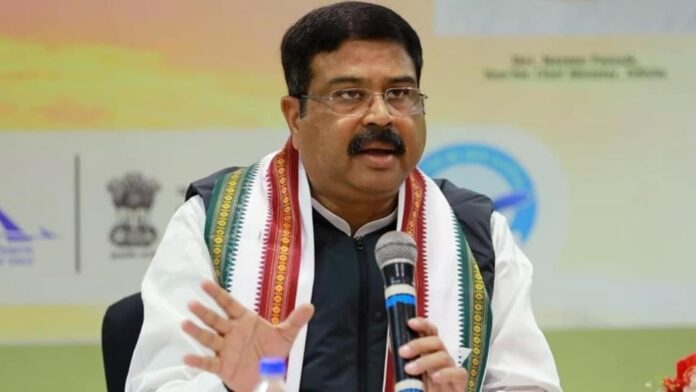Appearing for class 10 and 12 board exams twice a year will not be mandatory for students and the option is being introduced to reduce stress caused by the fear of single opportunity, Union Education Minister Dharmendra Pradhan has said.
In an interview to PTI, Pradhan said the issue of ‘dummy schools’ cannot be ignored and the time has come to have a serious discussion about it.
“The students will have the option of appearing for the (class 10 and 12 board) exams twice a year just like engineering entrance exam JEE. They can choose the best score… but it will be completely optional, no compulsion.
“The students often get stressed thinking they lost a year, their chance is gone or could have performed better… the option is being introduced to reduce the stress caused by the fear of single opportunity,” Pradhan said.
“If any student feels that he is completely prepared and is satisfied with the score in the first set of exams, he can choose not to appear for the next exams. Nothing will be mandatory,” he added.
According to the New Curriculum Framework (NCF) announced by the Ministry of Education in August, board examinations will be held twice a year to ensure that students have enough time and opportunity to perform well and get an option to retain the best score.
Pradhan said he has received positive feedback from students on the plan to conduct board exams twice a year.
“I met students after the New Curriculum Framework (NCF) was announced. They have appreciated this and are happy with the idea. We are trying that the exams are conducted twice a year from 2024 itself,” he said.
Asked about the record student suicides in Rajasthan’s Kota this year, the minister said, “It is a very sensitive issue. No lives should be lost… they are our children. It is our collective responsibility to ensure the students are stress-free.”
Over two lakh students move to Kota annually to prepare for competitive exams such as the Joint Entrance Exam (JEE) for engineering and the National Eligibility-cum-Entrance Test (NEET) for admission to medical colleges.
According to official figures, 23 students committed suicide in Kota this year — the highest ever for the country’s coaching hub. Last year, the figure was 15.
Pradhan said the time has come to have a serious discussion on the issue of ‘dummy schools’.
“The issue cannot be ignored. Although the number of such students is not very high as compared to the total number of students… the time has come to have serious discussions and deliberations on the subject,” he said.
The minister said the Centre is working towards ensuring that students do not require coaching.
Several NEET and JEE aspirants enrol themselves in schools in their home states and move to Kota to attend coaching classes. They do not attend fulltime schools and directly appear for the board exams.
The issue of ‘dummy schools’ has been flagged by several experts who believe not attending school hinders students’ personal growth and they often feel isolated and stressed.
Asked why the Central Advisory Board of Education (CABE) hasn’t met in the last three years, Pradhan said, “CABE is being reconstituted”.
“The older version of CABE was very broad… demands of today’s education system are different. At a time when we are making a paradigm shift with the new National Education Policy, CABE also needs to be remodelled.
“At the end of the day, CABE will review what is being introduced now, be it new curriculum, new credit framework, accreditation or any other reform,” he said.
The minister further said two IITs — Delhi and Madras — are in progressive stages of setting up their offshore campuses and talks are on with several other countries who have expressed interest.
“The Ministry of External Affairs is coordinating it and various kinds of options and combinations are being deliberated upon. (External Affairs) Minister (S) Jaishankar himself is looking into it. I am also with him,” Pradhan said.
He said the guidelines for foreign universities to set up their campuses in India are also under deliberation and will be notified soon.
“We are going to make a paradigm shift. So, we will go ahead after exploring all possibilities and clearing all doubts. The guidelines are under deliberation and I am confident that the UGC will notify them soon,” he said.
Asked about the decision of states like Karnataka and West Bengal not to implement the National Education Policy (NEP), Pradhan said, “Their objections are not academic but political.”
“I have still not been able to understand what their actual objection is about. West Bengal has taken out an alternative document. We have seen that and it is 99 per cent similar to the NEP,” he said.
He said both education and skill development ministries are working together to nurture a generation of learners who are equipped with the right skills to thrive in a 21st-century workplace.
“To achieve this, we are creating synergy between education and skills to provide students with both academic and practical skills. Today, there are close to 1,000 skill hubs with one lakh candidates enrolled in them. Going forward, we plan to set up 5,000 such centres,” said Pradhan, who is also the Skill Development minister.
“The Academic Bank of Credit enables students mobility across Higher Education Institutions and helps in seamless integration of skills and experiences into a credit-based system,” he said.



